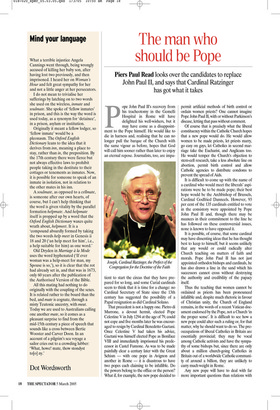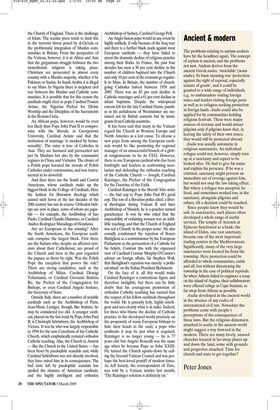The man who should be Pope
Piers Paul Read looks over the candidates to replace John Paul II, and says that Cardinal Ratzinger has got what it takes Pope John Paul II’s recovery from his tracheotomy in the Gemelli Hospital in Rome will have delighted his well-wishers, but it may have come as a disappointment to the Pope himself. He would like to die in harness and, realising that he can no longer pull the barque of the Church with the same vigour as before, hopes that God will call him sooner rather than later to enjoy an eternal repose. Journalists, too, are impa tient to start the circus that they have prepared for so long, and some Curial cardinals seem to think that it is time for a change: no Cardinal Secretary of State since the 13th century has suggested the possibility of a Papal resignation as did Cardinal Solano.
That precedent is not a happy one. Pietro di Murrone, a devout hermit, elected Pope Celestine V in July 1294 at the age of 79, could not cope and five months later he was encouraged to resign by Cardinal Benedetto Gaetani. Once Celestine V had taken his advice, Gaetani was himself elected Pope as Boniface VIII and immediately imprisoned his predecessor in Castel Fumone. As was to be made painfully clear a century later with the Great Schism — with one pope in Avignon and another in Rome — it is disastrous to have two popes each claiming to be infallible. Do the powers belong to the office or the person? What if, for example, the new pope decided to permit artificial methods of birth control or ordain women priests? One cannot imagine Pope John Paul II, with or without Parkinson’s disease, letting that pass without comment.
Of course that is precisely what the liberal constituency within the Catholic Church hopes that a new pope would do. He would allow women to be made priests, let priests marry, go easy on gays, let Catholics in second marriage take the Eucharist, and Anglicans too. He would temper the Church’s objection to stem-cell research, take a less absolute line on abortion, permit birth control and allow Catholic agencies to distribute condoms to prevent the spread of Aids.
It is difficult to come up with the name of a cardinal who would meet the liberals’ aspirations were he to be made pope; their best hope would be the Archbishop of Brussels, Cardinal Godfried Danneels. However, 93 per cent of the 135 cardinals entitled to vote in the consistory were appointed by Pope John Paul II and, though there may be nuances in their commitment to the line he has followed on these controversial issues, none is known to have opposed it.
It is possible, of course, that some cardinal may have dissenting ideas that he has thought best to keep to himself, but it seems unlikely that any would or could radically alter Church teaching on matters of faith and morals. Pope John Paul II has not just appointed orthodox bishops and cardinals, he has also drawn a line in the sand which his successors cannot cross without destroying the authority and credibility of the papacy itself.
Thus the teaching that women cannot be ordained as priests has been pronounced infallible and, despite much rhetoric in favour of Christian unity, the Church of England remains, in the words of a recent Vatican document endorsed by the Pope, not a Church ‘in the proper sense’. It is difficult to see how a new pope could alter such a ruling or, for that matter, why he should want to do so. The preoccupations of liberal Catholics in Britain are essentially provincial; they may be vocal among Catholic activists and have the sympathy of some bishops but, since there are only about a million church-going Catholics in Britain out of a worldwide Catholic community of around a billion, they are unlikely to carry much weight in Rome.
Any new pope will have to deal with far more important questions than relations with the Church of England. There is the challenge of Islam. The secular press tends to limit this to the terrorist threat posed by al-Qa’eda or the problematic integration of Muslim communities in Britain. From the perspective of the Vatican, however, it is in Africa and Asia that the gargantuan struggle between the two monotheistic religions is taking place. Christians are persecuted in almost every country with a Muslim majority, whether it be Pakistan or Sudan. In Saudi Arabia it is illegal to say Mass. In Nigeria there is incipient civil war between the Muslim and Catholic communities. It is possible that for this reason the cardinals might elect as pope Cardinal Francis Arinze, the Nigerian Prefect for Divine Worship and the Discipline of the Sacraments in the Roman Curia.
An African pope, however, would be even less likely than Pope John Paul II to compromise with the liberals; at Georgetown University, Cardinal Arinze said that the institution of marriage ‘is mocked by homosexuality’. The same is true of Catholics in Asia. They are harassed and persecuted not just by Muslims but also by the communist regimes in China and Vietnam. The choice of a Polish pope boosted the morale of Polish Catholics under communism, and was instrumental in its downfall.
And then there are the South and Central Americans, whose cardinals make up the biggest block in the College of Cardinals. Here the fashion for liberation theology which caused such havoc in the last decades of the 20th century has run its course. Orthodox bishops are now in place, some of whom are papabile — for example, the Archbishop of Sao Paulo, Cardinal Claudio Hummes, or Cardinal Andres Rodriguez Maradiaga of Honduras.
Are no Europeans in the running? After the South Americans, the European cardinals comprise the largest block. First there are the Italians who, despite an affected cynicism about their Catholicism, are proud of the Church and have in the past regarded the papacy as theirs by right. Was the Polish Pope the exception that proves the rule? There are strong candidates, such as the Archbishop of Milan, Cardinal Dionigi Tettamanzi, or Cardinal Giovanni Battista Re, the Prefect of the Congregation for Bishops, or even Cardinal Angelo Sodano, the Secretary of State.
Outside Italy, there are a number of notable cardinals such as the Archbishop of Paris, Jean-Marie Lustiger, though, like Sodano, he may be considered too old. A younger cardinal, placed on the fast track by Pope John Paul II, is Christoph Schönborn, the Archbishop of Vienna. It was he who was largely responsible in 1994 for the new Catechism of the Catholic Church, which emphatically restated orthodox Catholic teaching. Alas, the Church in Austria — like the Church in the United States — has been beset by paedophile scandals and, while Cardinal Schönborn was not directly involved, they have mired him in its consequences. The bad taste left by paedophile scandals has spoiled the chances of American cardinals, and the highly intelligent and orthodox Archbishop of Sydney, Cardinal George Pell.
An Anglo-Saxon pope would in any event be highly unlikely, if only because of the Iraq war; and there is a further black mark against most European cardinals — they have failed to arrest the dramatic decline of religious practice among their flocks. In France, the past four decades has seen a 30 per cent decline in the number of children baptised into the Church and only 10 per cent of the remnant go regularly to Mass. In Britain, the number of churchgoing Catholics halved between 1958 and 2005. There was an 83 per cent decline in Catholic marriages and a 61 per cent decline in infant baptisms. Despite the widespread esteem felt for the late Cardinal Hume, parishes in his archdiocese of Westminster are sustained not by British converts but by immigrants from Catholic countries.
It has been said that many in the Vatican regard the Church in Western Europe and North America as a lost cause. To choose a new pope from among the European cardinals would be like promoting the regional manager of an unsuccessful branch of a global conglomerate to be its CEO. However, there is one European cardinal who has been forthright and fearless in confronting secularism and defending the orthodox teaching of the Catholic Church — Joseph, Cardinal Ratzinger, the Prefect of the Congregation for the Doctrine of the Faith.
Cardinal Ratzinger is the liberals’ bête noire — the bad cop to Pope John Paul II’s good cop. The son of a Bavarian police chief, a liberal theologian during Vatican II and later Archbishop of Munich, he is a poacher turned gamekeeper. It was he who ruled that the impossibility of ordaining women was an infallible teaching, and that the Church of England was not a Church ‘in the proper sense’. He also roundly condemned the rejection of Rocco Buttiglioni as a commissioner by the European Parliament as the persecution of a Catholic for his beliefs. Contrast this with the expressed view of Cardinal Cormac Murphy-O’Connor’s adviser on foreign affairs, Sir Stephen Wall, that Buttiglioni’s rejection was merely ‘a political attack’ on the Italian President Berlusconi.
On the face of it, all this would make Cardinal Ratzinger a contentious figure and therefore ineligible; but there can be little doubt that his courageous promotion of orthodox Catholic teaching has earned him the respect of his fellow cardinals throughout the world. He is patently holy, highly intelligent and sees clearly what is at stake. Indeed, for those who blame the decline of Catholic practice in the developed world precisely on the propensity of many European bishops to hide their heads in the sand, a pope who confronts it may be just what is required. Ratzinger is no longer young — he is 77 years old: but Angelo Roncalli was the same age when he became Pope as John XXIII. He turned the Church upside-down by calling the Second Vatican Council and was perhaps the best-loved pontiff of modern times. As Jeff Israely, the correspondent of Time, was told by a Vatican insider last month, ‘The Ratzinger solution is definitely on.’



























































 Previous page
Previous page